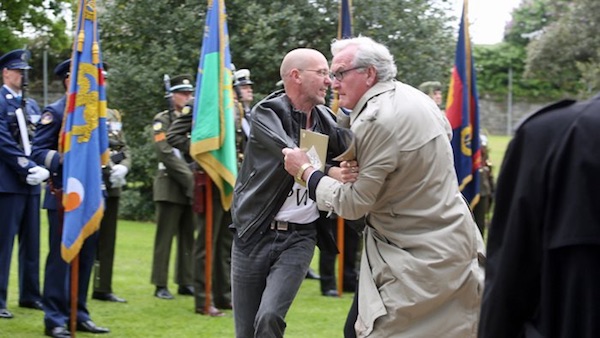
A bizarre intervention by the Canadian Ambassador to Ireland has drawn international attention to a revisionist state event in Dublin which honoured the British soldiers who died in 1916 fighting to maintain British rule in Ireland.
As republican Brian Murphy mounted a lone peaceful protest at Grangegorman Military Cemetery, ambassador Kevin Vickers suddenly set upon him, grabbing and dragging Mr Murphy as he attempted to speak out against the event.
Despite the provocation, Mr Murphy, who held a valid personal invitation, remained peaceful. He was subsequently arrested by the Gardai police for a general public order offense, while no action was taken against Vickers.
The ambassador, a former Canadian policeman, was lauded as a “hero” in Ireland’s pro-British establishment media, but questions have been raised in his home country. Canada has strong protections for the right to free speech, which is protected as a fundamental freedom under the Canadian Charter of Rights and Freedoms.
Speaking in Japan, Canadian prime minster Justin Trudeau was pressed to respond to the incident of whether Mr Vickers, who can claim diplomatic immunity against any charge of assault, should face disciplinary action. “If it lands on my table, I’ll take a look at it”, he said.
Vickers, the former sergeant-at-arms at Canada’s Parliament, shot and killed an an armed attacker inside the parliament buildings in 2014, and was appointed Canada’s ambassador to Ireland by way of reward.
But David Mulroney, a former Canadian ambassador to China, said Vickers was “not there as an honorary member of the Gardai”. And the Canadian Broadcasting Corporation (CBC) suggested Vickers may have violated the government’s code of conduct for diplomatic staff serving abroad.
Under the heading “Canada’s Reputation: Personal behaviour”, it notes: “Regardless of any legal immunity conferred upon representatives abroad, their conduct and actions will be subject to a greater degree of scrutiny and public interest than they would be at home.”
In a comment piece, the CBC’s national affairs editor Chris Hall said Mr Vickers was regarded as a man of “enormous personal integrity” and “of even greater personal courage”.
“But Vickers is no longer a security officer,” he continued. “He is Canada’s representative in Ireland. That role depends not on bravery but discretion. Ambassadors are supposed to stay out of domestic issues in their host country.”
“If he thought he was helping out by removing a protester, that’s not his job and that injects him and Canada into a political discussion that the Irish can and should manage for themselves.”
Mr Murphy, a father of three from Rathcoole, County Dublin, said he was pleased with the media attention. “I stood up to make my protest,” he said, and had described the event as a “shame” and an “insult”.
“I could see him (Vickers) standing up and heading straight for me and I put my hands up to stop him getting too close. The publicity it’s got is because of his actions, not mine,” he said.
Mr Murphy, who previously demonstrated at Glasnevin cemetery when the names of British soldiers killed in the Rising were inscribed on a commemorative wall, said there was a very large Garda presence.
He was wearing a shirt in support of the Irish Republican Prisoners Welfare Association and also wanted to highlight the case of the Craigavon Two, Brendan McConville and John Paul Wootton, jailed in 2012, as a miscarriage of justice.
But his protest mainly drew international attention to the controversial idea of a people commemorating their oppressors.
The Toronto Star described it as a “sensitive event given the deaths of hundreds of Irish nationalists in 1916, the execution of leaders of the uprising, and the subsequent declaration of martial law by the British and the arrest of thousands of citizens.”
Mr Murphy said he also feared a trend which could see hundreds of British war criminals being commemorated in future centenary events: “Does it mean in two or three years’ time they’ll be commemorating the Black and Tans, the Auxiliaries?”
![[Irish Republican News]](https://republican-news.org/graphics/title_gifs/rn.gif)
![[Irish Republican News]](https://republican-news.org/graphics/title_gifs/harp.gif)

